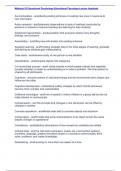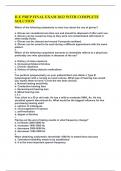Methods Of Educational Psychology-Educational Psycology-Lecture Handouts
Accommodation - ansAltering existing schemes or creating new ones in response to
new information
Action research - ansSystematic observations or tests of methods conducted by
teachers or schools to improve teaching and learning for their students
Adolescent egocentrism - ansAssumption that everyone shares one's thoughts,
feelings, and concerns
Assimilation - ansFitting new information into existing schemes.
Assisted Learning - ansProviding strategic help in the initial stages of learning, gradually
diminishing as students gain independence.
Case study - ansIntensive study of one person or one situation
Classification - ansGrouping objects into categories
Co-constructed process - ansA social process in which people interact and negotiate
(usually verbally) to create an understanding or to solve a problem. The final product is
shaped by all participants
Coactions - ansJoint actions of individual biology and the environment-each shapes and
influences the other
Cognitive development - ansGradual orderly changes by which mental processes
become more complex and sophisticated
Collective monologue - ansForm of speech in which children in a group talk but do not
really interact or communicate.
Compensation - ansThe principle that changes in one dimension can be offset by
changes in another.
Concrete operations - ansMental tasks tied to concrete objects and situations
Conservation - ansPrinciple that some characteristics of an object remain the same
despite changes in appearance
Correlations - ansStatistical descriptions of how closely two variables are related
Cultural tools - ansThe real tools (computers, scales, etc.) and symbol systems
(numbers, language, graphs) that allow people in a society to communicate, think,
solve, problems, and create knowledge.
Decentering - ansFocusing on more than one aspect at a time
,Methods Of Educational Psychology-Educational Psycology-Lecture Handouts
Descriptive studies - ansStudies that collect detailed information about specific
situations, often using observation, surveys, interviews, recordings, or a combination of
these methods.
Development - ansOrderly, adaptive changes we got through between conception and
death and remain for a reasonably long period of time.
Differentiated Instruction - ansTeaching that takes into account students' abilities, prior
knowledge, and challenges so that instruction matches not only the subject being taught
but also students' needs.
Disequilibrium - ansIn Piaget's theory, the "out-of-balance" state that occurs when a
person realizes that his or her current ways of thinking are not working to solve a
problem or understand a situation.
Educational Psychology - ansThe discipline concerned with teaching and learning
process; applies the methods and theories of psychology and has its own as well
Egocentric - ansAssuming that others experience the world the way you do.
Empirical - ansbased on systematically collected data
Equilibration - ansSearch for mental balance between cognitive schemes and
information from the environment
Ethnography - ansA descriptive approach to research that focuses on life within a group
and tries to understand the meaning of events to the people involved.
Evidenced-based practice in psychology (EBPP) - ansPractices that integrate the best
available research with the insights of expert practitioners and knowledge of the
characteristics, culture, and preferences of the client
Experimentation - ansResearch method in which variables are manipulated and the
effects recorded
Formal operations - ansMental tasks involving abstract thinking and coordination of a
number of variables
Goal-directed actions - ansDeliberate actions toward a goal.
Hypothesis - ansa prediction of what will happen in a research study based on theory
and previous research
,Methods Of Educational Psychology-Educational Psycology-Lecture Handouts
Hypothetico-deductive reasoning - ansA formal-operations problem-solving strategy in
which an individual begins by identifying all the factors that might affect a problem and
then deduces and systematically evaluates specific solutions
Identity - ansPrinciple that a person or object remains the same over time
Maturation - ansGenetically programmed, naturally occurring changes over time
Microgenetic studies - ansDetailed observation and analysis of changes in a cognitive
process as the process unfolds over a several-day or several-week period of time
Negative correlation - ansA relationship between two variables in which a high value on
one is associated with a low value on the other.
Example: height and distance from top of head to the ceiling
Neo-Piagetian theories - ansMore recent theories that integrate findings about attention,
memory, and strategy use with Piaget's insights about children's thinking and the
construction of knowledge
Object permanence - ansThe understanding that objects have a separate, permanent
existence
Operations - ansActions a person carries out by thinking them through instead of
literally performing the actions
Participant observation - ansA method for conducting descriptive research in which the
researcher becomes a participant in the situation in order to better understand life in
that group.
Participants/Subjects - ansPeople or animals studied
Personal development - ansChanges in personality that take place as one grows
Physical development - ansChanges in body structure and function over time
Positive correlation - ansA relationship between two variables in which the two increase
or decrease together.
Example: calorie intake and weight gain
Preoperational - ansThe stage before a child masters logical mental operations
Principle - ansestablished relationship between factors
Private speech - ansChildren's self-talk, which guides their thinking and action.
Eventually, these verbalizations are internalized as silent inner speech.
, Methods Of Educational Psychology-Educational Psycology-Lecture Handouts
Quasi-experimental studies - ansStudies that fit most of the criteria for true experiments,
with the important exception that the participants are not assigned to groups at random.
Instead, existing groups such as classes or schools participate in the experiments
Random - ansWithout any definite pattern; following no rule
Reflective - ansThoughtful and inventive. Reflective teachers think back over situations
to analyze what they did and why, and to consider how they might improve learning for
their students
Reversibility - ansA characteristic of Piagetian logical operations-the ability to think
through a series of steps, then mentally reverse the steps and return to the starting
point; also called reversible thinking
Reversible thinking - ansThinking backward, from the end to the beginning.
Scaffolding - ansSupport for learning and problem solving. The support would be clues,
reminders, encouragement, breaking the problem down into steps, providing an
example or anything else that allows the student to grow in independence as a learner.
Schemes - ansMental systems or categories of perception and experience
Semiotic function - ansThe ability to use symbols-language, pictures, signs, or gestures-
to represent actions or objects mentally.
Sensitive periods - ansTimes when a person is especially ready for or responsive to
certain experiences
Sensorimotor - ansInvolving the senses and motor activity
Seriation - ansArranging objects in sequential order according to one aspect, such as
size, or volume.
Single-subject experimental studies - ansSystematic interventions to study effects with
one person, often by applying and then withdrawing a treatment
Social development - ansChanges over time in the ways we relate to others
Sociocultural theory - ansEmphasizes role in development of cooperative dialogues
between children and more knowledgeable members of society. Children learn the
culture of their community (ways of thinking and behaving) through these interactions.
Statistically significant - ansnot likely to be a chance occurence
Teacher's sense of efficacy - ansA teacher's belief that he or she can teach even
difficult students





